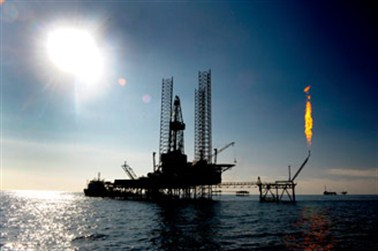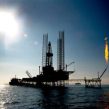
Can the Ukrainian Crisis Assist in Channeling Azerbaijani Gas to Europe?
Publication: Eurasia Daily Monitor Volume: 11 Issue: 108
By:

The latest Russia-Ukraine crisis has once again revealed the fragility of the energy security environment in Central and Eastern Europe. In particular, Russia’s repeated threats to cut its natural gas supplies, which transit through Ukraine, put pressure on European consumers dependent on Russia’s energy exports. Many recalled the winter 2009 “gas war” between Ukraine and Russia, which resulted in customers across the region, notably in Bulgaria, freezing because of the Kyiv-Moscow conflict (RIA Novosti, April 29). These fears were further underscored on Monday, June 16, with Gazprom’s announcement that it would be suspending gas shipments to Ukraine over its unpaid debts (Kyiv Post, June 16).
The Russia-Ukraine crisis has energy security implications beyond European Union territory, however. Indeed, it also directly impacts Azerbaijan. Today, the EU actively supports the Southern Gas Corridor, a project that intends to deliver natural gas from the Caspian basin to Europe across the South Caucasus and Anatolia, bypassing Russian pipelines. It is expected that the bulk of the initial delivered gas will be produced at the Azerbaijani Shah Deniz field during its second stage of development. According to current plans, when the Southern Corridor opens, Europe will begin receiving around 10 billion cubic meters (bcm) of Azerbaijani gas annually, which can be expanded in the future. Although 10 bcm is not a critically strategic amount of gas to offset Russia’s westward exports, it will be a first step in opening up new sources and transit routes that will not be dependent on Moscow’s will (see Azerbaijan and the Southern Gas Corridor to Europe: Implications for U.S. and European Energy Security, The Jamestown Foundation, Washington, DC, September 13, 2013).
Azerbaijan, in its turn, has been interested in accessing energy markets in Europe’s East, especially in Ukraine. Indeed, at the beginning of 2012, Ukrainian mass media quoted Azerbaijan’s ambassador to Ukraine Eynulla Madatli, who positively assessed the partnership between the two countries and stated that Azerbaijan was immediately ready to supply natural gas to Ukraine. The media further reported, however, that Azerbaijan and Ukraine failed to sign a bilateral gas agreement because of Turkish opposition to such a project (Segodnya.ua, February 9, 2012).
Additionally, since the early 2000s, Ukraine has showed interest in reviving Azerbaijani oil supplies to Ukraine through the Odessa-Brody pipeline. And with the Russian-Ukrainian gas crisis in 2009, Ukraine began to research the possibility of importing liquefied natural gas (LNG) from Azerbaijan, as well as receiving further gas supplies through Turkey. Azerbaijan’s public officials were initially skeptical about such plans. In particular, Industry and Energy Minister Natig Aliyev stated as recently as last year that Azerbaijan lacks the infrastructure for LNG exports (Abc.az, March 13, 2013). Nevertheless, already in February 2014, the Ukrainian LNG Terminal Company obtained a commitment from the government in Kyiv to allocate 13.5 hectares of land in the Odessa region for the construction of an LNG import terminal. Annual gas turnover at this planned facility is expected reach 10 bcm. The cost of the project is estimated at around 856 million euros ($1.16 billion) (ProNedra, February 11, 2014).
The Ukrainian crisis has also forced policymakers in the United States to focus more closely on Azerbaijan as a potential reliable source of natural gas for Washington’s closest allies in Europe. In his speech on the crisis in Ukraine, which he delivered at the Atlantic Council, the US Department of State’s Special Envoy and Coordinator for International Energy Affairs Carlos Pascual underlined the role of the Southern Gas Corridor in transporting Azerbaijani gas to Southern Europe to help achieve energy security for the region. In reaction to Moscow’s aggression in Ukraine, Pascual noted, Europe has finally begun to seriously discuss measures needed to prevent Russia from using its gas supply network as a tool for political pressure toward its neighbors (Azernews, April 7).
From this perspective, Azerbaijani President Ilham Aliyev’s April 2014 visit to Iran looks especially pertinent. Iran has the second largest natural gas reserves of any country in the world after Russia. The US Energy Information Administration has estimated Iran’s proven gas reserves at the start of 2013 to measure 1,187 trillion cubic feet (33.6 trillion cubic meters). However, in contrast with Russia, Iran is not currently a world gas supplier. In fact, Iran would need investments totaling several billion dollars just to tap its gas resources and make them available for export. Yet, if such investments were made possible, Azerbaijan and Turkey could serve as hubs for Iranian gas transiting across the Southern Corridor to European markets (Turan, April 12).
Despite the ongoing unpredictability of the crisis situation in Ukraine, undoubtedly the Kyiv-Moscow conflict will forever change the energy market dynamics in Europe. The EU and the US feel a renewed pressure to end Europe’s gas dependency on Russian gas. But with an absence of enough LNG terminals in Europe—which could potentially accept cheaper shale gas from the United States—policymakers will need to look at alternative gas suppliers in the Middle East, Iran or the Caspian Sea basin. For now, however, ongoing instability in the Middle East (see Terrorism Monitor, June 13) and the lack of clarity on the future of the international sanctions regime against Iran mean that the Caspian region remains the best alternative for Europe to ease its Russian gas dependency. The Ukrainian crisis has clearly hastened this process and now cajoles all sides to invest more heavily into the Southern Corridor project. That said, Moscow is likely to try to intervene, so the EU will need to be more aggressive and more tangibly united if it wants to pursue its members’ energy security interests.




